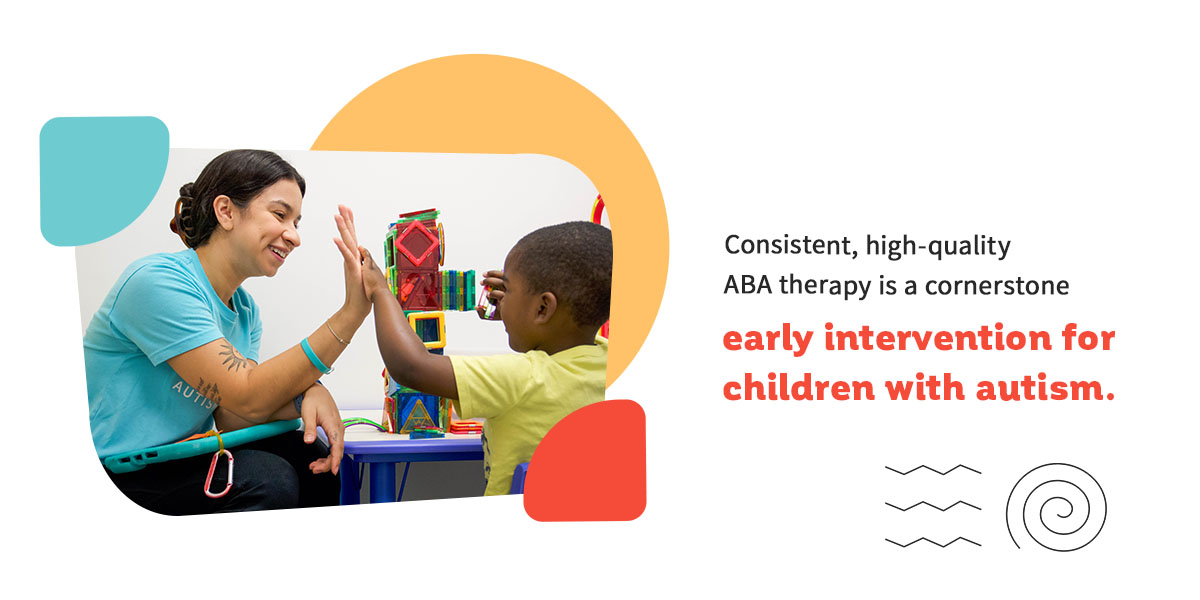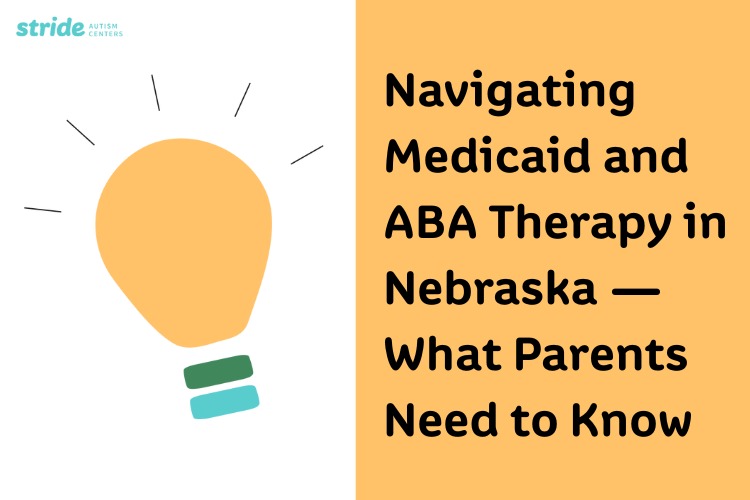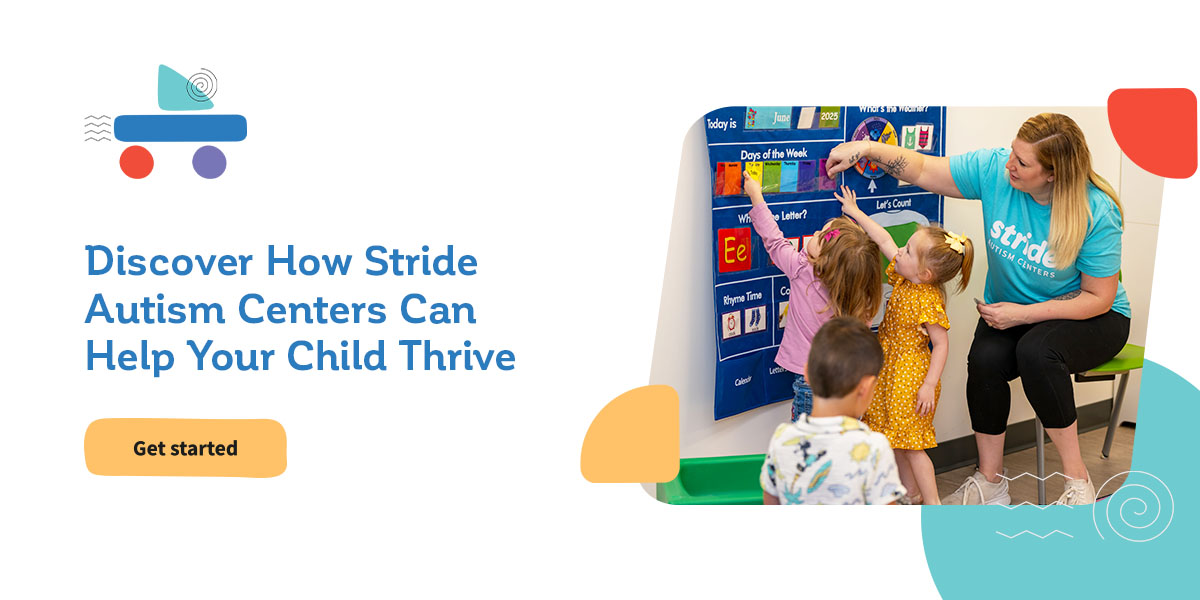Finding the right support for your child with autism can feel overwhelming, especially as Nebraska’s Medicaid rules for ABA therapy continue to change. If you’re worried about how these updates might affect your family’s access to care, we are here to help.
We’ve broken down the latest changes to Medicaid and ABA therapy in Nebraska, what this means for your child’s therapy, and how you can continue to access the support your kiddo deserves. We’ll also suggest alternative funding options and show you how Stride Autism Centers can help your family thrive.
Understanding the New Nebraska Medicaid and ABA Therapy Rules
Recent changes to Nebraska’s Medicaid program have reshaped how families can access and afford Applied Behavior Analysis (ABA) therapy for children with autism. These updates were designed to bring Nebraska’s reimbursement rates in line with neighboring states, but they also mean families and providers are facing new challenges. Understanding these changes is the first step in making informed decisions about your child’s care.
Here’s a snapshot of what parents need to know when navigating Medicaid and ABA in Nebraska:
- The Nebraska Department of Health and Human Services (DHHS) has lowered reimbursement rates for ABA therapy, effective August 1, 2025.
- Reimbursement for direct therapy by behavior technicians is cut by 48%, the parent training payment drops by 51%, and care plan and protocol adjustments by Board-Certified Behavior Analysts (BCBAs) are reduced by 37%. Additionally, payments for treatment assessment development are reduced by 28%.
- Cuts to the Nebraska Medicaid rates for ABA services have affected certain providers, making it harder for some clinics to operate at their previous capacity.
Funding reductions may affect the amount of support you receive for your child’s therapy. Lawmakers and advocacy groups are actively reviewing the impact of these changes on families and providers.
How These Changes Impact Services and Financial Support
The new Medicaid rules have immediate and noticeable effects on the availability and quality of ABA therapy in Nebraska. Families may need to adjust their expectations and explore new ways to secure the support their children need.
The impact will likely be felt in the following ways:
- Reduced therapy hours: Some children may receive fewer hours of therapy each week due to funding constraints.
- Longer waitlists: With fewer resources, providers may have to limit new enrollments, leading to longer wait times for services.
- Loss of services: In some cases, families may lose access to their preferred provider or have to travel farther for care.
Importance of ABA Therapy

Consistent, high-quality ABA therapy is a cornerstone of early intervention for children with autism. Even as funding and access change, the benefits of ABA remain clear and essential for your child’s growth and development.
Stronger Social and Communication Skills
ABA therapy helps children with autism build stronger social and communication skills by teaching them how to express their needs, understand social cues, and interact effectively with peers and adults. Through structured social skills training, your kiddo can learn to navigate conversations, share, take turns, and respond appropriately in different situations.
This support reduces feelings of isolation by helping children form meaningful connections and relationships and sets the stage for greater confidence and participation in everyday life.
Enhanced Emotional Regulation Skills
Kids learn valuable strategies for managing frustration, anxiety, and other strong emotions. By learning how to regulate their feelings, children with autism may experience fewer meltdowns and be better able to participate in daily activities at home, school, and in the community. This improved emotional regulation helps them feel more confident and comfortable as they navigate new situations and challenges.
Increased Independence
ABA therapy helps kiddos build important self-care, daily living, and problem-solving skills that empower them to become more independent. As they master these abilities, they gain confidence and autonomy. This makes it easier to participate in routines and challenges at home, in school, and within their community. Increased independence supports overall growth to help your child thrive in everyday life.
Enhanced School Readiness
Early ABA intervention helps prepare your child for the routines and expectations of kindergarten and beyond. Through therapy, they will learn important skills through joyful experiences. This includes following instructions, taking turns, and staying on task — all foundational abilities that make it easier for your little one to adjust to classroom environments and thrive in their early school years.
Family Empowerment
A mission-driven ABA program committed to achieving meaningful outcomes empowers your family with training support so you can reinforce positive behaviors at home. This easy, stress-free guidance makes you, as the parents or caregivers, active partners in your child’s progress for a more consistent and supportive environment. As a result, children with autism achieve developmental gains and numerous victories that bring you both joy.
A Customized Approach Tailored to Your Child’s Needs
ABA therapy is a customized approach based on your child’s unique strengths and focal areas. Each program is individualized, which allows therapy to fit the specific areas where your child needs the most support. Through ongoing assessment and regular adjustments, your child’s goals remain relevant and achievable, helping them make steady progress over time.
Alternative Financial Options for ABA Therapy
If the changes to Medicaid and ABA therapy in Nebraska have affected your family’s access to therapy, there are still ways to secure support. Exploring alternative funding options can help bridge the gap and keep your child’s progress on track.
Leverage Private Health Insurance
If you have private health insurance, explore whether your plan covers ABA for your child. Many insurance policies now include autism benefits, and understanding the details can help you make the most of your coverage. As you review your insurance policy to see if ABA therapy is covered, be sure to ask your insurer about pre-authorization requirements and the documentation needed for ABA coverage.
Find Grants and Nonprofit Support
You may be able to apply for financial assistance through national and local grants and nonprofit organizations dedicated to supporting children with autism. These resources can help cover the costs of therapy and related services. Consider the following options as you explore additional support:
Organizations to explore include Autism Care Today and United Healthcare Children’s Foundation. Application processes vary, so check each organization’s website for eligibility and deadlines.
Discuss Payment Plans With Providers
If insurance or grants don’t fully cover the cost of ABA therapy, your ABA center can open up flexible options that fit your budget. Some ABA centers offer flexible payment plans or sliding-scale fees for families paying out of pocket. Don’t hesitate to discuss your financial situation — many providers are happy to work with families to ensure continuity of care. Ask providers about their private pay rates, available discounts, and payment schedule options.
How Stride Autism Centers Can Help
Stride Autism Centers is committed to helping your family navigate Medicaid and ABA in Nebraska so you can continue accessing high-quality therapy. Children with autism who receive appropriate ABA therapy early in life often require fewer services as they get older, making it a cost-effective approach for insurance companies in the long run.
Our team is aware of the challenges you’re facing, and we’re here to support you by:
- Helping you explore all available insurance options, including Medicaid, private insurance, and alternative funding sources.
- Guiding you through the process of applying for grants or setting up payment plans.
- Providing evidence-based ABA programs designed to meet your child’s unique needs, with a focus on social skills, independence, and school readiness.
Our goal is to empower your family and help your child thrive, no matter what changes come your way.
Discover How Stride Autism Centers Can Help Your Child Thrive
No matter how the State of Nebraska Medicaid and ABA services rules change, your child’s potential remains limitless. Stride Autism Centers is here to help you navigate every step of the journey — from understanding your funding options to providing compassionate, evidence-based ABA therapy.
There is no need to let uncertainty stand in the way of your child’s progress. Call our caring, experienced team at 515-207-5251 or connect with us online to see how we can help your family access the support you need so your kiddo thrives.







